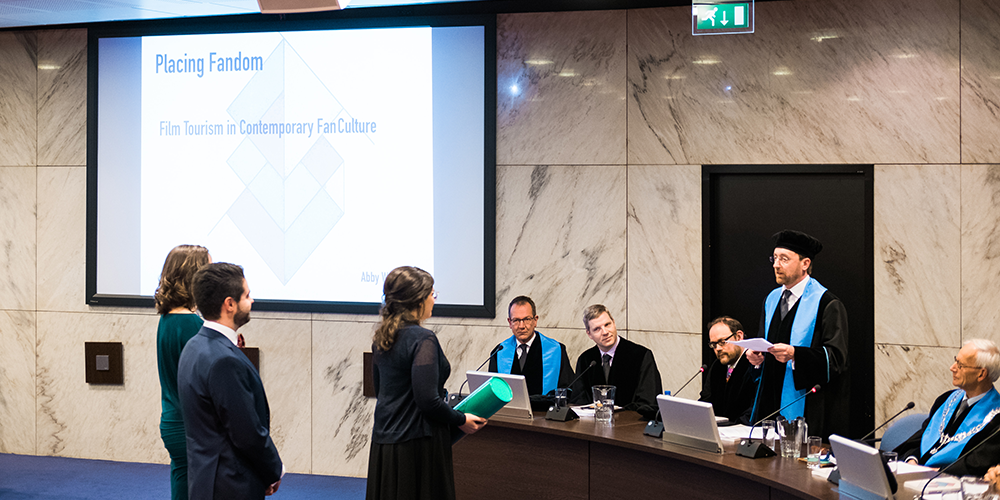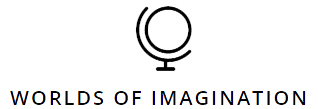
01 Dec Mission Completed
Blog by Stijn Reijnders (photo by Jan Arsenovic)
On the 9th of November, Abby Waysdorf successfully defended her dissertation. She did a great job. She was very gentle, eloquent and to-the-point in answering the questions raised by the committee members Matt Hills, Cornel Sandvoss, Rebecca Williams, Eggo Mueller, Koen van Eijck and Jeroen Jansz.
Most questions touched upon the conceptual level of Abby’s dissertation. For example, questions were raised concerning the concept of the ironical imagination (“is there imagination without irony in the case of film tourism?”) and the hyperdiegetic mode of the film tourist experience (“can you understand the hyperdiegetic without having analyzed the diegetic”?). In addition, we discussed the pros and cons of the well-known metaphor of “media pilgrimage”, of which Abby is rather sceptical. According to her, the notion of “media pilgrimage” is mainly suitable as an emic concept – when used in the field by respondents. Another debate touched upon the usefulness of the somewhat restricted concept of “film tourism” in an age of multi-media and media convergence.
For me this was a very special moment, as Abby is the first PhD student to receive her doctorate under my supervision. On a more personal level, I was also touched by the idea that only two months earlier, my father – who is an emeritus professor specialized in ecology and management of marine mammals – guided his final PhD student through the same academic ritual. The topic, however, somewhat differed: Sophie Brasseur’s dissertation was entitled “Seals in motion. How movements drive population development of harbour seals and grey seals in the North Sea”. As far as I understood, these seals were not driven by imaginations and story worlds – though I guess one never knows for sure.
After Abby’s defence, I was allowed to deliver a short, celebratory speech – the so-called ‘laudatio’. The text of the speech will be attached below, as it provides a nice idea of the kind of research that is being done by our research group in general, and by Abby in particular.
Laudatio Abby
Very learned doctor Waysdorf: it’s a privilege and a pleasure to congratulate you with your new degree, also on behalf of your second promotor Liesbet van Zoonen. Congrats also to Richard and Julie Waysdorf, who are here all the way from Denver, and to your many friends and colleagues gathered here today. I would also like to thank the professors Cornell Sandvoss, Matt Hills, Rebecca Williams, Eggo Mueller, Jeroen Jansz and Koen van Eijck for their willingness to participate in this committee and their active role in the ceremony.
Today I’m standing here before you as a proud supervisor. And I’m proud for three reasons. Firstly, it prides me that today we have seen the defence of the first dissertation on film tourism at any Dutch university. Secondly, I’m proud because of the particular content of this dissertation and the contribution it makes to this field of research. Finally, and this is of course what makes me most proud of all, is the fact that today Abby has defended her dissertation in style and has received her well-deserved PhD. Let me elaborate these aspects one by one.
As most of you are probably aware, Abby’s research is part of a larger project, entitled “Locating Imagination. An Interdisciplinary Perspective on Literary, Film and Music Tourism”. This project, funded by the Dutch Science Foundation, aimed to analyse and compare how literature, film and music – each in their own way – stimulate the imagination and literally move people around the globe. In recent years we have witnessed a boom in this type of tourism. Stories from the media have become a dominant force in the way in which people envision the world and to which places or cities they feel attached to. But up until now, most research on film tourism has been limited to individual, eye-catching examples. This fragmented and isolated research makes it very difficult to generate more fundamental, overarching theories.
Abby ‘s dissertation Placing Fandom is one of the first larger and more fundamental publications that offers a broader picture of what film tourism is about. Abby dives deep into one of the core questions of the phenomenon: why are people interested in visiting film locations and how do they experience being ‘there’? This brings us to the second point of my laudatio: I’m not only proud of the fact that this dissertation has seen the light. I’m also very pleased by its particular content. Now, in order to explain this, I think I need to start with the question: what drives Abby?
Abby, in my view it’s quite obvious: your heart is firmly located in the world of fandom. You simply love every aspect of fan culture. For example, I remember the party we once had in my place, and you agreed to join the party but only on one condition: that you could crash on my couch and watch your favourite show: the Eurovision Song Contest. You were literally glued to the screen. And because of your enthusiasm we got pleasantly stuck as well. I think that you feel a lot of commitment not only to fans themselves, but also to fan scholars. This niche academic community has become one of your second homes.
Part of the success of this dissertation is due to the fact that you didn’t hide or ignore your affiliation with fandom. You decided to combine this new topic of film tourism with your already existing expertise in fan studies. This combination of film tourism with fan studies provided a rich contribution to both fields. On the one hand you showed how one can’t properly understand the motives and experiences of film tourists if one doesn’t understand their love for the related media product. It all starts with fandom. On the other hand, you have made fan scholars more aware of the spatial dimension of fandom. You showed how the existence of so-called “places of the imagination” can anchor fandom. Fan communities can gather online or in anonymous fan convention halls, but having a real place (like Portmeiron in the case of The Prisoner fans) does make a crucial difference in solidifying fan culture.
Finally, I would like to spend some words on perhaps the most important reason why this is a memorable day. Today you have received your PhD and you have become “doctor”. This moment is the final closure of a period of four years in which we have worked together closely. Together we have gone through important but sometimes also challenging moments. For example, the first case study had some hiccups and made you aware that you still needed to further develop your interview skills. But over the years you gained more confidence and greatly improved your technique. Likewise, in the mid-phase of the project, you were struggling with getting your first papers published. But this problem was solved as well. And now, on the day of your defence, you can already boast three papers publications in prestigious journals, as well as a couple of second-author texts. That is definitely something to be proud of!
In addition to the challenges we faced and overcame, we also had a lot of fun, together with Nicky, Leonieke and the other PhDs candidates. Memorable are our joint conference trips to Brugge and Prague. As well as our brainstorm events closer to home: on Texel. Only last month, on one of the coldest and wettest weekends of the year, you, Emiel and Balazs endured the cold and took a dive in the North Sea. I guess that moment (the dive into the silver-blue surface of the North Sea) more or less characterizes you and your role in our research group. You have always been a very warm, active and contributing team member not afraid of a challenge.
Your path here has brought you to an impressive array of places: born in Washington, you spent your teens in Denver, did your Bachelor in Seattle and your Master in Utrecht. And today you have received your PhD in Rotterdam. Your academic background is diverse as well: you were raised in the humanities, but here in Rotterdam you learned all the ins and outs of the social sciences. This rich mixture of roots and disciplines is a very strong asset that makes you employable for many different areas. Thus, I foresee a bright future for you, hopefully (for a while at least) here with us in Rotterdam, but I trust you to be able to make a mark anywhere on the globe. Time will only tell where. For now, I would once again like to congratulate you with your excellent dissertation and the way you defended it today. Abby, very learned doctor Waysdorf: mission completed. Let’s celebrate!



Sorry, the comment form is closed at this time.